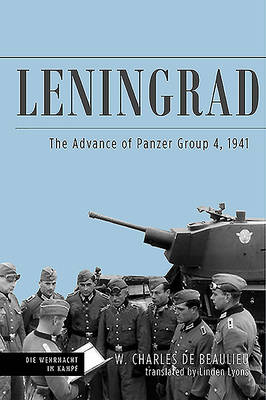
- Afhalen na 1 uur in een winkel met voorraad
- Gratis thuislevering in België vanaf € 30
- Ruim aanbod met 7 miljoen producten
- Afhalen na 1 uur in een winkel met voorraad
- Gratis thuislevering in België vanaf € 30
- Ruim aanbod met 7 miljoen producten
Zoeken
Omschrijving
Narrative of the advance of Panzer Group 4 towards Leningrad In 1941, available in English for the first time.
At the launch of Operation Barbarossa, Army Group North was tasked with the operational objective of Leningrad--what lay between it and the city was 800 kilometers of the Baltic states, and 18-20 infantry divisions, two cavalry divisions, and eight or nine mechanized brigades of the Red Army. It was apparent that in order to succeed they would have to race through to the western Dvina and establish a bridgehead before the Russians exploited this natural feature to organise a defensive front. Panzer Group 4, which included LVI Panzer Corps and XLI Panzer Corps, was to lead the way. By the end of the first day the group had pushed 70 kilometers into enemy territory. Red counterattacks on their unprotected flanks slowed them down, resulting in the tank battle of Raseiniai, but the group managed to capture Dünaburg on the Western Dvina on June 26, with a bridgehead established shortly thereafter. The group then pushed northeast through Latvia to the Stalin Line. In mid-July Hoepner was preparing to push the last 100 kilometers to Leningrad, however Leeb, commander of the army group, had other plans for the group and the advance did not continue for several more weeks.
This account of Panzer Group 4's advance was written by Walter Charles de Beaulieu, chief of staff of Panzer Group 4. Published in German in 1961, this is the first English translation. Beaulieu not only gives a detailed account of the Panzer Group's advance, but also offers an assessment of the fighting, an examination of how Panzer Group 4's operations were affected by the limitations imposed on Army Group North, and the lessons that can be learnt from its experiences in the Baltic States. He concludes with a discussion of whether Leningrad could ever have been taken.
At the launch of Operation Barbarossa, Army Group North was tasked with the operational objective of Leningrad--what lay between it and the city was 800 kilometers of the Baltic states, and 18-20 infantry divisions, two cavalry divisions, and eight or nine mechanized brigades of the Red Army. It was apparent that in order to succeed they would have to race through to the western Dvina and establish a bridgehead before the Russians exploited this natural feature to organise a defensive front. Panzer Group 4, which included LVI Panzer Corps and XLI Panzer Corps, was to lead the way. By the end of the first day the group had pushed 70 kilometers into enemy territory. Red counterattacks on their unprotected flanks slowed them down, resulting in the tank battle of Raseiniai, but the group managed to capture Dünaburg on the Western Dvina on June 26, with a bridgehead established shortly thereafter. The group then pushed northeast through Latvia to the Stalin Line. In mid-July Hoepner was preparing to push the last 100 kilometers to Leningrad, however Leeb, commander of the army group, had other plans for the group and the advance did not continue for several more weeks.
This account of Panzer Group 4's advance was written by Walter Charles de Beaulieu, chief of staff of Panzer Group 4. Published in German in 1961, this is the first English translation. Beaulieu not only gives a detailed account of the Panzer Group's advance, but also offers an assessment of the fighting, an examination of how Panzer Group 4's operations were affected by the limitations imposed on Army Group North, and the lessons that can be learnt from its experiences in the Baltic States. He concludes with a discussion of whether Leningrad could ever have been taken.
Specificaties
Betrokkenen
- Auteur(s):
- Uitgeverij:
Inhoud
- Aantal bladzijden:
- 216
- Taal:
- Engels
- Reeks:
Eigenschappen
- Productcode (EAN):
- 9781612008752
- Verschijningsdatum:
- 1/07/2020
- Uitvoering:
- Hardcover
- Formaat:
- Genaaid
- Afmetingen:
- 155 mm x 231 mm
- Gewicht:
- 498 g

Alleen bij Standaard Boekhandel
+ 69 punten op je klantenkaart van Standaard Boekhandel
Beoordelingen
We publiceren alleen reviews die voldoen aan de voorwaarden voor reviews. Bekijk onze voorwaarden voor reviews.











